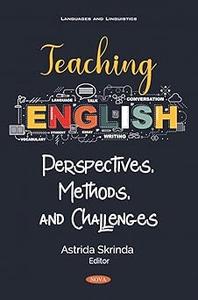
Free Download Astrida Skrinda, "Teaching English: Perspectives, Methods and Challenges "
English | ISBN: 1536161683 | 2019 | 163 pages | PDF | 4 MB
"Original peer-reviewed contributions from recognized and established scholars and practitioners offer a variety of perspectives on teaching English as a second or foreign language and an expanded focus on teaching in international contexts. The authors challenge several current practices from multiple viewpoints and offer innovations that are thoughtful and engaging. Definitely, we must build on our past and present knowledge of what works to refine and improve existing language teaching practices and, it is hoped, develop other practices that will be even better and more encompassing. Thus, Chapter 1 reports the launch of a newly designed problem-based learning program in which metacognitive strategy instruction is integrated into an English listening curriculum. It combines the Problem-Based Learning approach from education and the Metacognitive approach from second-language listening research. The author does a good job at the end to try to disentangle the effects of the two treatments. This is an exciting time to be teaching English as a second or foreign language. In many countries, children are starting to learn English at an ever-younger age. Chapter 2 provides a meta-analysis of the situation currently observed in many English as a foreign language classes given to Polish and Slovak preschool learners, among others. It covers not only an analysis of a number of currently observed approaches, but also presents research-based propositions. Also, it suggests a handful of problem-grounded outcomes. We cannot be satisfied with the in-progress state of affairs but must seek out new ways to provide learners with the most effective and efficient language learning experiences possible, taking into account the learners’ goals, interests, and learning contexts. Chapter 3 concerns the attitudes of Polish English-language majors to their target language cultural learning. Though Chapter 3 leaves us with many questions unanswered, it sheds the light on the teaching of cultural elements, particularly in a European context. Finally, Chapter 4 offers a unique perspective on language instruction, particularly for audiences unfamiliar with Buddhist philosophy. Basically, it describes a teaching approach based on Buddhist philosophy, which would probably be very effective for someone familiar and/or interested in that particular school of thought. Alternatively, it would open readers’ mind to a completely different approach to language instruction, which may or may not work outside of its current context, but at least it has a very clear philosophical foundation and very clear set of procedures that are worth examining further. The intended audience are all those who are interested in teaching English as second or foreign language, including researchers, methodologists, curriculum and materials designers, teachers, and undergraduate and graduate students"-
Read more
Buy Premium From My Links To Get Resumable Support,Max Speed & Support Me
Links are Interchangeable – Single Extraction










Leave a Reply
You must be logged in to post a comment.